
File photo:In this photo students protest in front of the ministry of education(Photo: AL-Ahram)
Egypt's Sayyeda Zeinab prosecution questioned Wednesday seven high school students who were among protesters who gathered Tuesday in front of the Ministry of Education's headquarters.
The students, from Thanaweya Amma, or the general secondary level, protested in front of the ministry decrying what they described as an "unfair" education system.
The prosecution charged the students with violating the protest law, attacking police personnel by throwing rocks at them, injuring two police conscripts, sabotaging a police vehicle, and blocking traffic.
The 2013 protest law mandates that interior ministry approval must be attained before protests can be considered legal. Violators of the protest law can receive hefty fines and prison sentences.
The Tuesday protest resulted in clashes between police and students.
After the dispersal of the protest, education ministry officials met with some of the students and insisted they would look into their demands and investigate exam leaks that marred the end of the academic year testing period, Al-Ahram Arabic news website reported.
Among the officials present were the head of the exams committee, Mohamed Saad, and Minister of Education Mahmoud Abou El-Nasr.
In addition to demanding action on the exam leaks, students also posted three core demands on a Facebook page titled "We Have a Right."
The first demand is doing away with the current system of determining a student's university faculty according to the grade point average (GPA) attained. For example, medical and engineering schools are usually the top-ranking faculties, meaning that only students with a high enough GPA can enrol.
The second demand is developing Egypt's educational system so it can compete with developed countries.
The third demand is respecting the dignity of Egyptian students and teachers.
Around 450,000 students take the final exam nationwide under the new one-year system, while approximately 43,000 others are being tested under the now-phased out two-year system.
Short link: